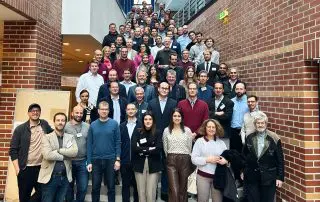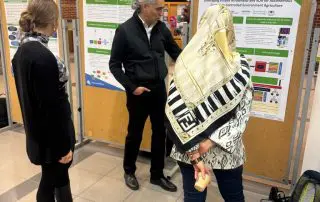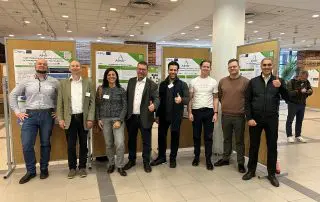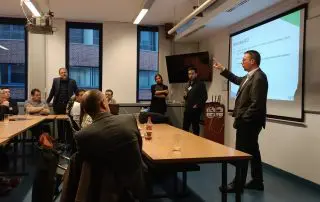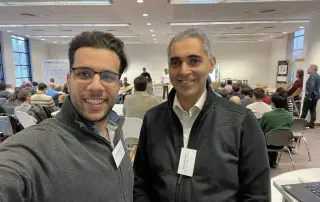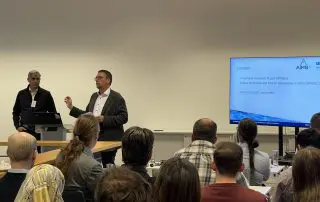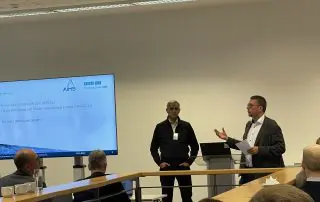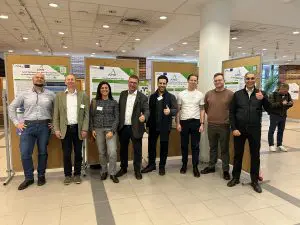 Two major EU-projects on the future of technology in industry came together for a Deep Tech Workshop in Budapest this November: AIMS5.0 and fVPN Arrowhead. Studio SDIS of RSA FG is part of Use Case 11 in AIMS5.0 and joined for the undertaking. Scientific Officer Markus Tauber, Senior Researcher Belal Abu-Naim and Researcher Yasin Ghafourian gave insight into their work in AIMS5.0 and Arrowhead.
Two major EU-projects on the future of technology in industry came together for a Deep Tech Workshop in Budapest this November: AIMS5.0 and fVPN Arrowhead. Studio SDIS of RSA FG is part of Use Case 11 in AIMS5.0 and joined for the undertaking. Scientific Officer Markus Tauber, Senior Researcher Belal Abu-Naim and Researcher Yasin Ghafourian gave insight into their work in AIMS5.0 and Arrowhead.
On the one hand, they presented their work on the “Arrowhead-compliant AI-gym” and the “Arrowhead and SOA for Autonomous Control”. The AI-Gym serves as an interactive environment for model development, training, and refinement, supporting various programming languages and machine learning frameworks. The AI-gym integrates with Eclipse Arrowhead to enhance IoT integration through its secure, modular architecture, facilitating communication between AI models and IoT devices.
On the other hand, the team presented a framework for implementing Autonomous Elements in Controlled Environment Agriculture(CEA)–systems using a Service-Oriented Architecture (SOA). CEA–systems can significantly benefit from the integration of artificial intelligence and MAPE-K (Monitor, Analyze, Plan, Execute, Knowledge) to optimize environmental conditions and resource usage. The researchers also presented a series of autonomous elements, including humidity management, temperature management, nutrient solution control, air quality management, and light management, each tailored to specific aspects of the CEA environment.
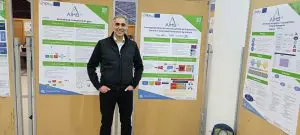
Researcher Belal Abu-Naim with the RSA FG-posters. Foto: RSA FG
At the poster session they presented their AIMS5.0 Vertical Farming Use Case, as well as the Self-Assessment Tool for Regulatory compliance assessment of industrial AI applications. The idea of Use Case 11 “AI-supported Industrial IoT for Indoor Food Production” is to create a controlled environment for agriculture to reduce costs, produce high-quality yields and ensure a stable crop supply using minimal land and water resources. Selecting and calibrating the parameters for this is a complex process, that is enabled by NLP– and AI based-Algorithms.
The self-assessment tool will be a Retrieval Augmented Generation (RAG)-based chatbot which will be provided with the relevant regulations, ethical and trustworthy guidelines and standards. During the usage time, the user who is either a developer or user of an industrial AI application, will be presented with a checklist and asked to describe their AI application and will then be presented with a list of standards and regulations that need to check whether their application complies with the rules that apply to it.
More on the Self-Assessment Tool can be found in this recently published open access article in ERCIM-news: Engineering Secure, Trustworthy, and Ethically Sound AI-Based Computer Systems.
Hosted at the Budapest University of Technology and Economics, the workshop provided an opportunity to dive deep into both projects and drive AI, IoT and automation forward. Participants worked toward aligning the objectives of the two projects, to ensure the development of more resilient and efficient solutions.


